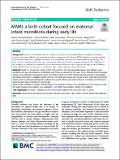Por favor, use este identificador para citar o enlazar a este item:
http://hdl.handle.net/10261/180903COMPARTIR / EXPORTAR:
 SHARE SHARE
 CORE
BASE CORE
BASE
|
|
| Visualizar otros formatos: MARC | Dublin Core | RDF | ORE | MODS | METS | DIDL | DATACITE | |

| Título: | MAMI: a birth cohort focused on maternal-infant microbiota during early life |
Autor: | García Mantrana, Izaskun CSIC ORCID; Alcántara, Cristina CSIC ORCID; Selma Royo, Marta; Boix-Amorós, Alba CSIC ORCID; Dzidic, Majda CSIC ORCID; Gimeno Alcañiz, José Vicente CSIC ORCID; Úbeda-Sansano, Isabel; Sorribes-Monrabal, Ignacio; Escuriet, Ramón; Gil-Raga, Fernando; Parra Llorca, Anna; Martínez-Costa, Cecilia; Collado, María Carmen CSIC ORCID | Palabras clave: | Cohort study Microbiota Diet Lactation Neonates Meconium Early nutrition Growth Breast milk Antibiotics Births |
Fecha de publicación: | 3-may-2019 | Editor: | BioMed Central | Citación: | BMC Pediatrics 19(1): 140 (2019) | Resumen: | [Background] Early microbial colonization is a relevant aspect in human health. Altered microbial colonization patterns have been linked to an increased risk of non-communicable diseases (NCDs). Advances in understanding host-microbe interactions highlight the pivotal role of maternal microbiota on infant health programming. This birth cohort is aimed to characterize the maternal microbes transferred to neonates during the first 1000 days of life, as well as to identify the potential host and environmental factors, such as gestational age, mode of delivery, maternal/infant diet, and exposure to antibiotics, which affect early microbial colonization. [Methods] MAMI is a prospective mother-infant birth cohort in the Spanish-Mediterranean area. Mothers were enrolled at the end of pregnancy and families were follow-up during the first years of life. Maternal-infant biological samples were collected at several time points from birth to 24 months of life. Clinical and anthropometric characteristics and dietary information is available. Specific qPCR and 16S rRNA gene sequencing as well as short chain fatty acid (SCFAs) profile would be obtained. Multivariable models will be used to identy associations between microbiota and clinical and anthropometric data controlling for confounders. MAMI would contribute to a better understanding of the interaction between diet, microbiota and host response in early life health programming, enabling new applications in the field of personalized nutrition and medicine. |
Versión del editor: | https://doi.org/10.1186/s12887-019-1502-y | URI: | http://hdl.handle.net/10261/180903 | DOI: | 10.1186/s12887-019-1502-y | E-ISSN: | 1471-2431 |
| Aparece en las colecciones: | (IATA) Artículos |
Ficheros en este ítem:
| Fichero | Descripción | Tamaño | Formato | |
|---|---|---|---|---|
| MAMI_birth_cohort_maternal-infant_microbiota_early_life.pdf | 1,25 MB | Adobe PDF |  Visualizar/Abrir |
CORE Recommender
PubMed Central
Citations
21
checked on 23-abr-2024
SCOPUSTM
Citations
23
checked on 23-abr-2024
WEB OF SCIENCETM
Citations
24
checked on 27-feb-2024
Page view(s)
379
checked on 22-abr-2024
Download(s)
217
checked on 22-abr-2024

